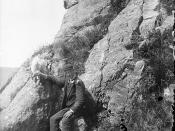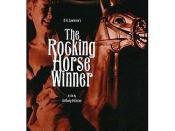Does the possession of money or material possessions lead to happiness? Or does
it lead to destruction? In his story "The Rocking Horse Winner," D.H. Lawrence
depicts an example of how the pursuit of materialistic items will lead to destruction.
"The Destructors" by Graham Greene also exemplifies the pursuit of material satisfaction
in the form of notoriety which also leads to destruction. These authors argue that the
pursuit of material possessions gives a false sense of happiness, and that this pursuit only leads to destruction.
In both stories the authors create characters who believe that the pursuit of
materialistic ends will lead to happiness. In "The Rocking Horse Winner," Paul's mother, in a search for happiness, equates having "stuff" with her social status, which the author illustrates with the statement that "...[ they ] felt themselves superior to anyone in the neighborhood" (Lawrence 302). This woman wants her notoriety.
"The mother had a small income, the father had a small income, but not nearly enough for the social position..." (Lawrence 302). To achieve this she needs money. To her, this equation is the solution to her happiness.
However, her problem is that the more she acquires, the more she wants. The author illustrates this spiraling desire by showing what happened when the household gains more possessions: "And yet the voices in the house... simply trilled and screamed...there must be more money! Oh-h-h there must be more money. Oh, now, now-w! Now-w there must be more money - more than ever..." (Lawrence 311). The money from Paul does not quench her thirst, but only serves to make her thirstier.
In "The Destructors," Trevor brings up an idea to destroy an old man's house. The Wormsley Common car-park gang would be famous: "There would be headlines in the...


